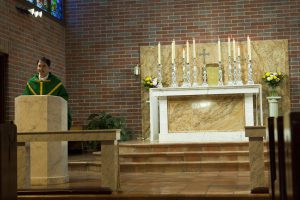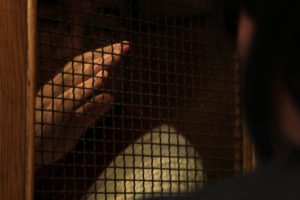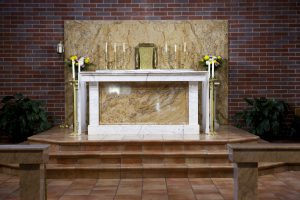Today we have a great gift. The Novena Committee has purchased a new set of candlesticks for the altar: six large ones to be placed next to the tabernacle and six smaller ones on the main altar, with a mounted crucifix in the center. This arrangement is popularly called the “Benedictine Arrangement,” because Pope Emeritus Benedict suggested this as a way of focusing us more on God during Mass.
Why are we doing this? For most of Church history, everyone during Mass faced the same direction: East. The sun rises on the East, and since the sun was a symbol of Jesus, everyone, including the priest, faced Jesus, who will come again. We’ve all heard the description of Mass prior to Vatican Council II where “the priest had his back to the people.” This actually isn’t the case. Catholics, until recently, never thought of the priest as turning his back to the people—that’s a sociological interpretation. Rather, they correctly understood that all of us are on a pilgrimage, moving towards a destination, i.e., heaven, and so our posture at Mass was meant to face our heavenly goal.
After Vatican Council II, we started celebrating Mass with the priest facing the people to emphasize the aspect that Mass is a sacred meal. This is good, but one thing that’s happened in practice is that Mass has become desacralized. We’re so focused on ourselves, we’ve simplified the language of the prayers, simplified the symbols at Mass, simplified the vestments so that everything would be more easily understood. These well-intentioned changes unfortunately meant that we generally lost a sense of the sacred, where Mass was viewed as something heavenly, where we could give worship to the Father by offering His Son.
Many Catholic parishes are now trying to recover the sense of the sacred by singing more sacred music, having more beautiful vestments, and using more sacred symbols. Pope Benedict has championed this set-up so that all of us focus more on Jesus and what He did for us: His death and resurrection.
Now some people might say, “But, Father, I can’t see you as well.” (I’m actually doing you a favour.) Remember, the focus isn’t on the priest, but on the paschal mystery, so we can look at the cross, which reminds us that what happened 2,000 years ago is what’s happening now during Mass.
 This arrangement is also extremely beautiful. What we said in February now applies here, “Beauty leads to God.” We put in brighter and whiter light bulbs in the sanctuary so that there’s more light, because our church is a bit on the dark side. You’ll notice that the light shines brilliantly off the silver, so much so that we need to wear sunglasses when celebrating Mass. We also chose silver because our church is full of brown, yellow and golden colours, so the silver colour brightens our environment.
This arrangement is also extremely beautiful. What we said in February now applies here, “Beauty leads to God.” We put in brighter and whiter light bulbs in the sanctuary so that there’s more light, because our church is a bit on the dark side. You’ll notice that the light shines brilliantly off the silver, so much so that we need to wear sunglasses when celebrating Mass. We also chose silver because our church is full of brown, yellow and golden colours, so the silver colour brightens our environment.
We thank the Novena Committee and those who have donated to the Novena. All the funds from the novena always go to improving the liturgy of the Mass, from the stained glass windows here in the sanctuary, to the chairs for the celebrant and deacons, which has also made such a big difference for the beauty of the Mass.
The Mass is the most important thing we do and the highest prayer we have, so we want to communicate that this is a beautiful place to be, a beautiful place to pray, and what we do here deserves our best.
This focus on God leads now to the main part of the homily. God is the most important person in the world and wants to be the center of our life, so what is one way He communicates with every person, whether Catholic or non-Catholic? One word… Conscience. Our conscience is our “most secret core and… sanctuary. There [we are] alone with God whose voice echoes in [our] depths” (Gaudium et spes, 16).
Some of my favourite movies are the Bourne trilogy, not because of the action, but because the film is grounded in a human character with a conscience. What makes the film compelling is that this man, like other assassins in the film, chose to violate his conscience, and they suffer the consequences: they can’t sleep, have terrible headaches, and are like machines: deadpan in their expressions. At one point he says, “I can see the face of every person I’ve killed. I’ve tried to apologize for what I’ve done, for who I am… None of it makes it any better.”
Conscience is a great gift! We can try to ignore it, but never can fully. Why? Because God loves us too much and never lets go of us. He never stops whispering, “This is right, this is wrong. You’re better than that. You used to care.” We can try to ignore it by being too busy, by saying “Everyone else does it,” or “It’s not that bad,” but God’s voice can never be completely extinguished. When we do ignore it or go against it, we suffer physical reactions to guilt: we’re sad, don’t want to talk, can’t sleep, lose our appetite, or stop smiling.
St. Paul speaks today, in the second reading, about his “earlier life” when he “was violently persecuting the Church of God and was trying to destroy it” (Gal 1:13). We know from his letters that he’s actually ashamed of his earlier life (See 1 Cor 15:9; 1 Tim 1:13).
All of us, when we slow down and think about who we are, what we’re doing and what we’ve done, may realize that there may be parts of our life, perhaps an earlier life, that we’re ashamed of.
 Pope Francis has called this year the Holy Year of Mercy, a time of reconciliation. So every night during our novena the homily will be about a different theme of reconciliation. Today, we’re dealing with reconciliation with God. For example Fr. Bryan will talk about reconciliation with ourselves (forgiving and accepting ourselves), Fr. James Kairu about reconciliation with our past, Deacon Andrew about reconciliation with spouses (because he’s the only one who’s married to a woman), Fr. Lucio about reconciliation with our family, and we’ll finish it off with reconciliation with the Church.
Pope Francis has called this year the Holy Year of Mercy, a time of reconciliation. So every night during our novena the homily will be about a different theme of reconciliation. Today, we’re dealing with reconciliation with God. For example Fr. Bryan will talk about reconciliation with ourselves (forgiving and accepting ourselves), Fr. James Kairu about reconciliation with our past, Deacon Andrew about reconciliation with spouses (because he’s the only one who’s married to a woman), Fr. Lucio about reconciliation with our family, and we’ll finish it off with reconciliation with the Church.
Yet the first person we should always be reconciled with is God, because He’s the most important one and the easiest one to reconcile with.
When I was 14, I went to Confession for the first time. I had hoped to have the nice priest in my church, but was assigned the mean priest. The confession took one hour and two things happened: 1) I was really impressed by the priest: he was actually very kind, funny, smart, and wise (afterwards we became good friends). So I thought: I’d like to be like that some day. 2) I made a bad Confession: there were some sins in my life that I was ashamed of telling; I was just too embarrassed to bring them up. So I didn’t. I knew I did something wrong but didn’t know what else to do.
That summer I went on a youth retreat and again made another bad Confession. But sometime that year, I found a book on my mother’s shelf which said if we don’t confess our mortal sins and die in a state of mortal sin, then we choose to go to hell. Needless to say I was very worried.
The next summer I went on a retreat again and it changed my life. God was lovingly urging me in my conscience to confess everything and I couldn’t shake it. I was petrified before I went. We would be waiting in line, and when it was my turn, I’d ask the person behind me to go first. Eventually I ran out of people behind me. So during the Confession, God gave me the grace to say everything. The priest was very kind, I was crying, and all I remember was asking at the end, “Am I forgiven?” And he said, “Yes!” Being so vulnerable and then feeling that love changed my life. I was on fire! I felt so loved by God, so free, like a huge weight had been lifted off my shoulders, and that’s when I started thinking about giving my life to God. My reaction was: “This is it! This is so awesome! I’m so happy!” I felt like St. Paul: I had encountered Jesus who had called me before I was born, and that love inspired me to follow Him.
My brothers and sisters, it’s human nature to hide things we’re embarrassed of. So sometimes we don’t make good confessions. But, God, loving us so much, wants us to admit everything. Why? Because it’s about a relationship. If I say, “Honey, I’m sorry about lying to you, insulting your mother, but not about hitting you,” is our relationship healed? The sacrament of Reconciliation is about healing our relationship with God, and the only way to do that is to say we’re sorry for all the times we’ve hurt Him. If we forget to mention something, that’s okay, because it’s not deliberate. The next time we remember it, we will confess it. But if we withhold something, downplay it, hide it deliberately, then the doctor can’t heal what we don’t tell him (CCC 1456).
If we’ve made some bad confessions in the past, Jesus suggests gently: “Go to Confession and bring it all up.” This is what we do: Go to Confession and say, for example, “Forgive me, Father, for I have sinned. It’s been a year since my last confession. But, Father, I made a bad Confession when I was 18 years old.” And then we confess all the sins (because none of the confessions we made have been valid) since our last good confession: in this case, when we were 17 years old.
Now the Church teaches we have to confess all mortal sins “in kind and number.” Now most people don’t know this, but it’s in the Code of Canon Law so this is official. This means that we have to (1) specify our sins and, to the best of our ability, (2) the number of times it happened. Why? Because we have to take responsibility for our actions, and because there’s a big difference, for example, between committing adultery once, and doing it for many years. One time was probably just a big mistake; the other one shows that it was on-going and much more serious.
During Confession, we could just go through the commandments and it might sound something like this. The following is Archbishop Sheen’s example: the man’s 80 years old, and he’s covering 50 years of his life. He can’t remember everything perfectly so it sounds like this: “Father, for 20 years, I never went to Mass, I never fasted. Many times a day, I took God’s name in vain, I lied in court 5 times, I helped get an abortion twice, I was an alcoholic for 10 years, I had impure thoughts every day for about 30 years, I committed adultery many, many times over 3 years; I only thought about making money, never gave to any charity except when I was forced to; I only thought about dinners, parties and having fun; I never showed my wife affection; I let my children do as they pleased and then got angry at them.”
It doesn’t have to be so specific that we say, for example, “In Grade 2 I pulled Susie’s hair.” It’s enough that we say, “In school, I was sometimes mean.” On the other hand, it has to be more specific than, “I was impure,” because there are lots of ways we can be impure.
In the pews today, we’ve put examinations of conscience that can guide us through the steps of Confession and help us review our actions. When there are doubts, just ask the priest, “Father, can you help me, please?” Now before reading the Examination, please read the introduction. That is the context which helps the whole thing make sense. The sacrament of Reconciliation is about a relationship! The first thing God says to all of us is, “You are good and you are loved.” Once we know we’re loved, then we can understand how sin hurts the one who loves us. The examination will help us face these sins, but please don’t get discouraged. Sorrow for sins is good, but not discouragement. Guilt is good, but not hatred of self. And if we learn that certain things are sins that we never knew were sins, then we’re not guilty, because we have to know something is wrong before we do it (For example, see “Why Getting Drunk is a Sin“).
Given this homily, and the fact that every homily during the novena will be dealing with reconciliation, we’ll have the sacrament of Reconciliation available this Monday to Saturday, 6:15-7:15 p.m.

Rev. Andrew Leung of St. Basil’s makes the sign of the cross from behind the grill of his confessional. April 14, 2011. (Jayme Poisson/Toronto Star).
My brothers and sisters, there’s nothing better than having a clear conscience. If we make good confessions, we’ll able to be like St. Paul, who had an “earlier life,” and then say, “I’m not like that anymore. That’s the past.” After we confess everything, we hear the words from the priest and know in our hearts, “Your sins are forgiven. Go in peace.” We’re finally reconciled with God.
